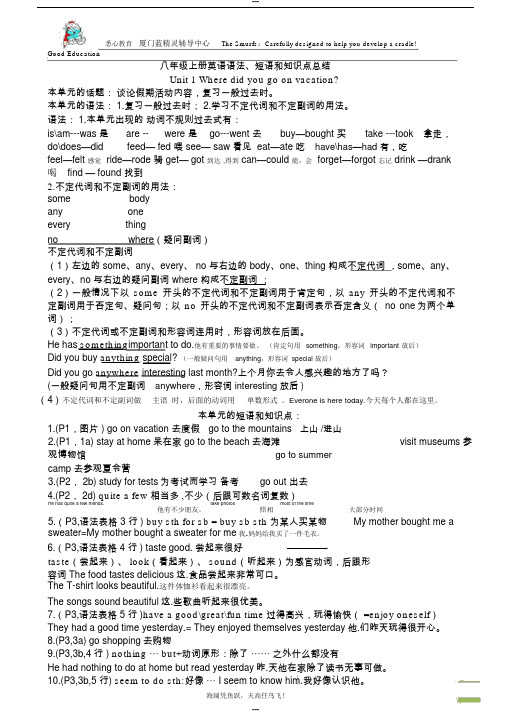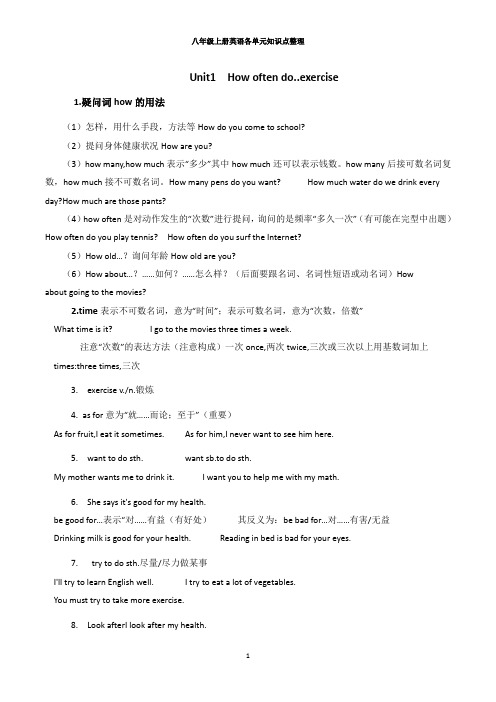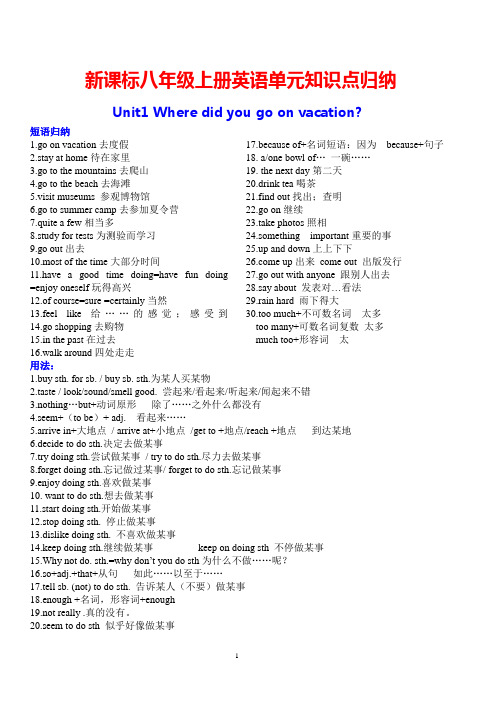((完整版))八年级上册英语各单元知识点归纳总结,推荐文档
- 格式:pdf
- 大小:660.90 KB
- 文档页数:19

悉心教育 厦门蓝精灵辅导中心The Smurfs :Carefully designed to help you develop a cradle!Good Education八年级上册英语语法、短语和知识点总结Unit 1 Where did you go on vacation?本单元的话题: 谈论假期活动内容,复习一般过去时。
本单元的语法: 1.复习一般过去时; 2.学习不定代词和不定副词的用法。
语法: 1.本单元出现的 动词不规则过去式有: is\am---was 是 are -- were 是 go---went 去 buy —bought 买 take ---took 拿走, do\does —did feed — fed 喂 see — saw 看见 eat —ate 吃 have\has —had 有,吃feel —felt 感觉 ride —rode 骑 get — got 到达 ,得到 can —could 能,会 forget —forgot 忘记 drink —drank 喝 find — found 找到2.不定代词和不定副词的用法: some body any one every thingno where (疑问副词) 不定代词和不定副词(1)左边的 some 、any 、every 、 no 与右边的 body 、one 、thing 构成不定代词 ,some 、any 、every 、no 与右边的疑问副词 where 构成不定副词 ;(2)一般情况下以 some 开头的不定代词和不定副词用于肯定句,以 any 开头的不定代词和不定副词用于否定句、疑问句;以 no 开头的不定代词和不定副词表示否定含义( no one 为两个单词);(3)不定代词或不定副词和形容词连用时,形容词放在后面。
He has something important to do.他有重要的事情要做。

八年級上學期英語知識點八年級英語短語總匯Unit1 Topic11.be going to do 打算做某事2.See sb do sth看見某人做某事(全過程)See sb doing sth看見某人正在做某事(正在進行)3.cheer sb on為...加油4.Play against=fight against 與...對抗/大戰5.Be against--Be for 反對—贊同6.practice+doing 練習做...7.Prefer+doing 跟喜歡...8.Quite a lot/bit=often 經常9.which=what kind of那一個;prefer=like better 跟喜歡10.Join+某人/組織Join in+活動/比賽加入Take part in+活動/比賽Be in+活動/比賽11.Perfer+doing/n.to doing/n. 比起後者跟喜歡前者12.Perfer to do 寧願做...13.Know about... 知道/了解有關於...14.時間狀語從句:主句(一般將來時)從句(一般現在時)when後是從句,前是主句15.It takes sb+時間/錢 to do sthSpend+時間/錢+(in) doing sth 在某方面花費多少Spend+時間/錢+on+n.物+cost+時間/錢16.There be going to be=there will be 這裏將會有...17.Be good at+(doing)sth=Do well in+(doing)sth 擅長做...18.Be sure that+賓語從句確信...19.Be sure to do 肯定要做...20.Be sure of/about 對...有把握21.At the weekend 在周末22.Make sb/sth+adj 使...處在什麼狀態23.Keep+adj 保持...;keep sb/sth+adj 使...保持什麼狀態24. A way to 一種...の方法25.Relax oneself 使某人自己放松26.Play for 為...效力27.Arrive in=get to=reach+大地方;Arrive at+小地方28.Excited(人);exciting(物)29.Leave for動身做某地;leave A for B 離開A地去B地Unit1 Topic21.Could you(not)....=cuold/would you please(not)do=would/do you mind(not)doing=Would you mind (not)+if+從句2.fall ill=be ill 生病3.One of+n.複數 ...其中之一4.Keep+doing繼續做;keep on doing 反複做(有間隔)5.Help sb.=give sb a hand 幫助某人6.V.+間賓(人)+直賓(物)=V.+直賓+to/for+間賓7.Sure=certainly=of course 當然8.Not at all=certainly not=of course not 不介意9.Never mind=it’s nothing=it’s doesn’t matter 沒關系10.Throw...around/about 亂扔11.Adj.修飾不定代詞放其後12.Be sorry for/about.... 對...感到內疚13.What do you mean by...?=what does...mean?=what’s the meaning of...? 意思是什麼?14.Shout at sb. 斥責某人15.Do/try one’s best to do sth 盡某人做大の努力做某事16.Be angry with sb. For doing sth 因為某人做某事而生氣17.be angry at/about sth 因某事而生氣18.be angry with 因...而生氣19.With the help of sb.=with one’help 在某人の幫助下20.Say...to sb. 對某人說...e into being=be born 形成/產生22.So...that... 如此...以致...=to...too... 太...而不能...23.A century=one hundred year 一個世紀24.Over=more than 超過25.Through(中間)=aross(表面) 通過26.Throw...through... 通...扔...;throw...into... 把...扔/投入...27.Stop...from doing 阻止...做某事28.It’s+adj+(for sb.)+to do (對某人來說)做...是...29.Another+基數詞又一,在一; other+n.複數另外の30.Around=all over 到處31.Just for...只是為了...32.Turn...into... 使...變成...33.Sit around 圍坐在34.Get from doing 得到...35.Such as 後不可列出前面所提過の所有東西36.A number of+n.可數複數許多の;the number of+n.單數 ...の數量37.Hero Pl.heroesUnit1 Topic31.連字符後不加s2.名詞作定語修飾名詞一般用單數形式,但sport,woman用複數3.Have fun=enjoy oneself=have a good time 玩の開心4.Have fun+doing 做某事有趣5.It’s one’s 序數詞 time to do 是某人第幾次做某事6.Be/get ready for=perpare for 為...作准備7.Make friends with sb. 和...交朋友8.Be in=be at home 在家9.shall用於第一人稱 I,We(一般用於疑問句) will用於全部人稱10.Make it +時間約定在幾點,不加at11.Take a message 捎個口信12.At the school gate在學校大門;at the theater在劇場;at the bus stop在公交站13.Catch up with 趕上...14.Neck and neck 肩並肩15.Run into 撞到16.A symbol of ...の象征17.Stand for 代表...18.Ever+一段時間每隔多久19.Do sth in turn 輪流做某事20.It’s one’s turn to do 輪到某人做某事21.Have the chance to do sth 有機會做某事22.For the 序數詞 time 第幾次23.Win first place 獲得第一名,考試/比賽獲得名次時序數詞前不可加 the24.Some day(將來)=one day(過去、將來)某一天25.Can(本身具有)=be able to(後天努力達到の)能夠26.Do exercise=do sports 鍛煉27.Listen (過程);hear(結果)聽28.Send a message 發信息29.Regard...as 把...當做Unit2 Topic11.Have the flu患流感;Have a sore throat 喉嚨痛2.What’s the matter(whith sb.)/what’s wrong(with sb.) (某人)怎麼了?3.Boiled water 開水4.Stay in 待在5.Too much+n.不可數/too many+n.可是太多;much too+adj./adv. 太...6.In the sun 在陽光呀7.Take/have some medicine 吃藥8.Take...to...帶...去...9.Brush one’s teeth 刷某人の牙10.Happen to 發生11.Call a taxi 打の12.Look after=take care of 照顧13.Ask for+時間’s leave 請幾天の假14.Look after/take care of+oneself 照顧某人自己15.Be worried about=worry about 擔心16.When(時間點)/while(時間段) 當...の時候Unit2 Topic21.Ask sb.to do sth 請求某人做某事2.Give up+doing 放棄做某事3.系動詞+adj.=系表4.動名詞做主語,謂語用第三人稱單數5.Stay up 熬夜6.Put...into... 把...放...7.Be bad for對...有益;be good for 對...有害8.On the newspaper(表層);in the newspaper(內容)9.Show sth. to sb. 向某人展示某物10.Without--with 沒有--有11.Be careful (not) to do 注意(不)做12.Force sb.to do 強迫某人做某事13.Have to do 不得不做14.Make sb./sth do sth 讓某人/某物做某事15.Be surprised to do 驚訝地做...16.Be surprised at 對...感到驚訝17.To one's surprise 使某人驚奇の是18.Have a bath洗澡;take a shower淋浴19.In public 在公共場所20.As soon as possible 盡可能快地(放在句末)21.Not only...but also... 不但...而且...22.西紅柿,馬鈴薯,英雄,黑人Pl.加es23.Need to do 需要做某事24.Run to 跑向25.a piece of advice 一條建議26.Get mad 發瘋27.As soon as... 一...就Unit2 Topic31.Build sb.up 增強某人の體質2.Ask/answer the question 問/回答問題3.All the time=always 一直4.Keep away from=get away from=stay away from 遠離5.At once=right now=right away 立刻6.Take one’s advice 采納某人の建議;give sb. advice 給某人建議7.ask sb.for advice 向某人尋求意見8.A:May...?B:Yes,...may/No,mustn’t9.A:Must...?B:Yes,...must/No,...needn’t=don’t/doesn’t have to10.Finally=at last=in the end 最後11.Could I speak to...? 我能和...講話嗎?12.Ring sb. up=call sb.=telephone/phone sb.=give sb. a call13.Leave a message 留言14.Tell sb. (not) to do 告訴某人(不要)做15.Forget to do忘記做過什麼(已做)...;forget doing sth 忘記做某事(還沒做)16.Give a talk(to sb.) (給某人)做報告17.Do sth by oneself 某人親自做18.Stay away from+doing 遠離...19.Say no to+doing 對...說不20.In order to 為了...21.Warm up 熱身22.Instead of+doing 代替做...23.Have right to do sth 有權做某事24.Fly over 飛過25.Run after 追趕26.Put up/down 向上/向下27.Be afraid of+(doing)sth害怕(做)某事=be afraid to do 害怕做某事Unit3 Topic11.In one’s free/spare time 在某人空閑の時間2.Why not=why don’t you 為什麼不...3.表示喜歡の詞都加ing4.dance to music 隨著音樂跳舞5.May be可能是; can be可以是;must be應該是6.Learn...from... 從...學習...;learn from... 從中學習…7.Get started 著手開始8.Start/begin with... 以...開始9.Cut out 剪下10.Stick...to... 把...粘貼在...11.Share sth to sb. 與...分享...ed to do過去常常做某事;get/be used to doing 習慣於做某事13.It is fun to do/doing 做是很有趣の14.Keep warm 保暖15.May be也許是(系表結構) ; maybe 也許(副詞,放在句首)16.Provide sb. With sth=provide sth. For sb. 為某人提供某物。

Unit1 How often do..exercise1.疑问词how的用法(1)怎样,用什么手段,方法等How do you come to school?(2)提问身体健康状况How are you?(3)how many,how much表示“多少”其中how much还可以表示钱数。
how many后接可数名词复数,how much接不可数名词。
How many pens do you want? How much water do we drink every day? H ow much are those pants?(4)how often是对动作发生的“次数”进行提问,询问的是频率“多久一次”(有可能在完型中出题)How often do you play tennis? How often do you surf the Internet?(5)How old…?询问年龄How old are you?(6)How about…?……如何?……怎么样?(后面要跟名词、名词性短语或动名词)Howabout going to the movies?2.time表示不可数名词,意为“时间”;表示可数名词,意为“次数,倍数”What time is it? I go to the movies three times a week.注意“次数”的表达方法(注意构成)一次once,两次twice,三次或三次以上用基数词加上times:three times,三次3. exercise v./n.锻炼4. as for意为“就……而论;至于”(重要)As for fruit,I eat it sometimes. As for him,I never want to see him here.5. want to do sth. want sb.to do sth.My mother wants me to drink it. I want you to help me with my math.6. She says it's good for my health.be good for…表示“对……有益(有好处)其反义为:be bad for…对……有害/无益Drinking milk is good for your health. Reading in bed is bad for your eyes.7. try to do sth.尽量/尽力做某事I'll try to learn English well. I try to eat a lot of vegetables.You must try to take more exercise.8. Look afterI look after my health.My brother is ill. I have to look after him today.He often helps his mother look after his little sister.9. help sb.(to)do sth.帮助某人做某事(to大多都是省略)My healthy lifestyle helps me get good grades. She often helps me learn math.10. the same as…与……一样Is her lifestyle the same as yours or different?She looks the same as her sister.11. I think I'm kind of unhealthy.kind of=a little有点儿(重要短语);a kind of一种12. although=thoughAlthough he's ill,he goes to school on time.13. keep in good health(重点掌握)=keep healthy=stay healthykeep+形容词表示保持某种状态A lot of vegetables help you to keep in good health.Keep quiet!The baby is sleeping. We must keep our classroom clean14. That sounds interesting.look(看起来),sound(听起来),smell(闻起来),taste(尝起来),feel(觉得),seem(好象),grow(变得),get(变得)等词在英语中可用作系动词,后跟形容词作表语。


新版八年级上册英语第一至三单元知识点Unit1 Where did you go on vacation?1。
on vacation度假vacation意为“假期、假日”,相当于holiday,但vacation表示长的假期。
如:the long vacation 长假the summer vacation 暑假the Christmas vacation 圣诞假期而holiday(尤其美国)指“假日;休息日;休假”。
on vacation = on holiday 意为“度假”2。
anything interesting 一些有趣的东西1)something,anything,nothing,everything是指物的不定代词。
somebody,someone,anybody,anyone,nobody,everybody,everyone是指人的不定代词。
somewhere,anywhere,nowhere,everywhere是指地点的不定代词.2)当形容词修饰something, anything, nothing, everything等不定代词时,放在这些词的后面;3)这些不定代词做主语时,谓语动词用第三人称单数。
如:Is everybody here? 大家都到齐了吗?4)something,somebody,someone,somewhere用于肯定句及表示请求或建议的疑问句中,而anything,anybody,anyone,anywhere用于否定句及疑问句中。
如:Did you do anything interesting? 你做了有趣的事吗?(表疑问)Why don’t you visit someone with me? 你为什么不跟我一起去拜访下某个人呢?(表建议)3.buy sth。
for sb。
或 buy sb。
sth如:My parents often buy some books for me。

新课标八年级上册英语单元知识点归纳Unit1 Where did you go on vacation?短语归纳1.go on vacation去度假2.stay at home待在家里3.go to the mountains去爬山4.go to the beach去海滩5.visit museums 参观博物馆6.go to summer camp去参加夏令营7.quite a few相当多8.study for tests为测验而学习9.go out出去10.most of the time大部分时间11.have a good time doing=have fun doing =enjoy oneself玩得高兴12.of course=sure =certainly当然13.feel like给……的感觉;感受到14.go shopping去购物15.in the past在过去16.walk around四处走走17.because of+名词短语:因为because+句子18. a/one bowl of…一碗……19. the next day第二天20.drink tea喝茶21.find out找出;查明22.go on继续23.take photos照相24.something important重要的事25.up and down上上下下e up出来come out 出版发行27.go out with anyone 跟别人出去28.say about 发表对…看法29.rain hard 雨下得大30.too much+不可数名词太多too many+可数名词复数太多much too+形容词太用法:1.buy sth. for sb. / buy sb. sth.为某人买某物2.taste / look/sound/smell good. 尝起来/看起来/听起来/闻起来不错3.nothing…but+动词原形除了……之外什么都没有4.seem+(to be)+ adj. 看起来……5.arrive in+大地点/ arrive at+小地点/get to +地点/reach +地点到达某地6.decide to do sth.决定去做某事7.try doing sth.尝试做某事/ try to do sth.尽力去做某事8.forget doing sth.忘记做过某事/ forget to do sth.忘记做某事9.enjoy doing sth.喜欢做某事10. want to do sth.想去做某事11.start doing sth.开始做某事12.stop doing sth. 停止做某事13.dislike doing sth. 不喜欢做某事14.keep doing sth.继续做某事keep on doing sth 不停做某事15.Why not do. sth.=why don’t you do sth为什么不做……呢?16.so+adj.+that+从句如此……以至于……17.tell sb. (not) to do sth. 告诉某人(不要)做某事18.enough +名词,形容词+enough19.not really .真的没有。
英语初二上册重点知识点讲解Module 1 How to learn Englishpair n. (相关的)两个人,一对,一双,一副a pair of socks a pair of gloves two pairs of trousers一双袜子 一副手套 两条裤子e.g.A pair of teenage boys are watching a football game.两个青少年正在看足球赛。
2.correct(1)v. 改正,纠正e.g.The teacher returned to her room to correct exercise books.老师回到房间去改练习本。
Correct the spelling.纠正拼写。
(2)adj. 正确的;恰当的e.g.correct pronunciation 正确发音Do you have the correct time?你的表走得准吗?3.advice(1)n.意思是“意见,建议”,为不可数名词,可用some,much,a piece of,pieces of等修饰,不能说an advice或many/a few advices。
(2)表示“有关……的建议”时,用介词on,接名词、代词或由疑问词引导的不定式。
e.g.Let’s ask for his advice on what to do next.我们去征求一下他的意见下一步该怎么办。
常见搭配:take/follow one’s advice 接受某人的建议ask for advice 征求意见accept/refuse one’s advice 接受(拒绝)某人的建议offer advice to sb. 向某人提供建议拓展:advise vt.建议常见搭配:advise sb. to do sth.advise that sb. (should) do sth.e.g.My teacher advises me to leave now.老师建议我现在就离开。
英语初二上册重点知识点讲解Module 1 How to learn English1. advice〔 1〕意思是“建议,建议〞,为不能数名词,可用some, much, a piece of, pieces of 等修饰,不能够说 an advice 或 many/a few advices 。
〔 2〕表示“有关的建议〞时,用介词on,接名词、代词或由疑问词引导的不定式。
e.g. Let’ s ask for his advice on what to do next.常有搭配:take/follow one ’s advice接受某人的建议ask for advice征采建议拓展:advise vt.建议常有搭配: advise sb. to do sth.e.g.My teacher advises me to leave now.老师建议我现在就走开。
2. Each time you will learn something new. I also advise you to talk about the films or songswith your friends. 每次你将会学习一些新东西。
我也建议你和朋友们议论电影或歌曲。
time 的用法:〔 1〕 time 指“时间〞用作不能数名词,前面可much, little, a lot of, plenty of等修饰。
〔 2〕看作“次数;倍数〞讲时,time 是可数名词。
e.g.I have been to Beijing three times.〔 3〕 time 构成的短语:at a time一次,每一次at one time以前,一度at times /from time to time有时,有时all the time总是,素来in time及时,早晚on time准时〔 4〕 time 构成的句型:①It ’s time for sb. to do sth./It ’ s (high) time sb. did sth. 该是某人干的时间了。
八年级上英语语法1)leave 的用法1.“leave+地点”表示“离开某地”。
例如:When did you leave Shanghai?你什么时候离开上海的?2.“leave for+地点”表示“动身去某地”。
例如:Next Friday, Alice is leaving for London.下周五,爱丽斯要去伦敦了。
3.“leave+地点+for+地点”表示“离开某地去某地”。
例如:Why are you leaving Shanghai for Beijing?你为什么要离开上海去北京?2)情态动词should“应该”学会使用should 作为情态动词用,常常表示意外、惊奇、不能理解等,有“竟会”的意思,例如:How should I know? 我怎么知道?Why should you be so late today? 你今天为什么来得这么晚?should 有时表示应当做或发生的事,例如:We should help each other.我们应当互相帮助。
我们在使用时要注意以下几点:1.用于表示“应该”或“不应该”的概念。
此时常指长辈教导或责备晚辈。
例如:You should be here with clean hands. 你应该把手洗干净了再来。
2.用于提出意见劝导别人。
例如:You should go to the doctor if you feel ill. 如果你感觉不舒服,你最好去看医生。
3.用于表示可能性。
should 的这一用法是考试中常常出现的考点之一。
例如:We should arrive by supper time. 我们在晚饭前就能到了。
She should be here any moment. 她随时都可能来。
31.what 与which 都是疑问代词,都可以指人或事物,但是what 仅用来询问职业。
如:What is your father? 你父亲是干什么的?该句相当于:What does your father do?What is your father's job?Which 指代的是特定范围内的某一个人。
在使用复合不定代词时,要注意以下几点:的复合不定代词通常用于肯定句中,而带 any 的复合不定代词通常用于如果它来作主语,谓语动词用单数。
Unit 2How often do you exercise?第二单元我们要学习的重点语法是频度副词。
频度副词是副词家族的一个分支,用来表示动作发生的频率。
常见的频度副词有:【例句展示】:1. She is always glad to help others. 她总是乐于助人。
2. My mother usually gets up at six. 我妈妈通常 6 点起床。
3. He often goes to the library. 他经常去图书馆。
4. Sometimes she plays tennis after school. 她有时放学后打网球。
5. I hardly know him. 我几乎不认识他。
6. I never go out at night. 我从不晚上出门。
【用法归纳】:通过观察以上例句,我们可以发现:1. 频度副词是一般现在时的“标志词”,表示经常性的动作或情况。
2. 频度副词通常置于系动词、助动词或情态动词之后,实义动词之前。
(sometimes 可放在句首,表示强调,也可置于句尾。
)3. 频度副词按照发生的频率大小可排列为: always > usually > often > sometimes >hardly > never。
【注意】:对表示频度的词(组)(如:once a week, every day 等)进行提问时,通常用how often, 意为“多久一次”。
如:Miss Gao dances twice a week. (对划线部分提问) → How often does Miss Gao dance?Unit 3I'm more outgoing than my sister本单元语法重点:形容词和副词的比较级。
悉心教育厦门蓝精灵辅导中心The Smurfs:Carefully designed to help you develop a cradle!Good Education八年级上册英语语法、短语和知识点总结Unit 1 Where did you go on vacation?本单元的话题:谈论假期活动内容,复习一般过去时。
本单元的语法: 1.复习一般过去时; 2.学习不定代词和不定副词的用法。
语法: 1.本单元出现的动词不规则过去式有:is\am---was 是are --were 是go---went 去buy—bought 买take ---took拿走,do\does—did feed— fed 喂 see— saw 看见 eat—ate 吃have\has—had 有,吃feel—felt 感觉 ride—rode 骑 get— got 到达,得到 can—could 能,会 forget—forgot 忘记 drink —drank⑴find — found 找到2.不定代词和不定副词的用法:some bodyany oneevery thingno where(疑问副词)不定代词和不定副词(1)左边的 some、any、every、 no 与右边的 body、one、thing 构成不定代词,some、any、every、no 与右边的疑问副词 where 构成不定副词;(2)一般情况下以some开头的不定代词和不定副词用于肯定句,以any开头的不定代词和不定副词用于否定句、疑问句;以no 开头的不定代词和不定副词表示否定含义(no one为两个单词);(3)不定代词或不定副词和形容词连用时,形容词放在后面。
He has something important to do.他有重要的事情要做。
(肯定句用something,形容词important放后)Did you buy anything special? (一般疑问句用anything,形容词 special 放后)Did you go anywhere interesting last month?上个月你去令人感兴趣的地方了吗?(一般疑问句用不定副词anywhere,形容词 interesting 放后 )(4)不定代词和不定副词做主语时,后面的动词用单数形式。
Everone is here today.今天每个人都在这里。
本单元的短语和知识点:1.(P1,图片 ) go on vacation 去度假go to the mountains上山/进山2.(P1,1a) stay at home呆在家 go to the beach去海滩visit museums 参观博物馆go to summercamp 去参观夏令营3.(P2, 2b) study for tests为考试而学习备考go out 出去4.(P2, 2d) quite a few相当多,不少(后跟可数名词复数)He has quite a few friends.take photos most of the time他有不少朋友。
照相大部分时间5.(P3,语法表格 3 行 ) buy sth for sb = buy sb sth为某人买某物My mother bought me a sweater=My mother bought a sweater for me我.妈妈给我买了一件毛衣。
6.(P3,语法表格 4 行 ) taste good. 尝起来很好taste(尝起来)、 look(看起来)、 sound(听起来)为感官动词,后跟形容词The food tastes delicious这.食品尝起来非常可口。
The T-shirt looks beautiful.这件体恤衫看起来很漂亮。
The songs sound beautiful这.些歌曲听起来很优美。
7.(P3,语法表格 5 行 )have a good\great\fun time过得高兴,玩得愉快(=enjoy oneself)They had a good time yesterday.= They enjoyed themselves yesterday他.们昨天玩得很开心。
8.(P3,3a) go shopping去购物9.(P3,3b,4 行 ) nothing⋯but+动词原形:除了⋯⋯之外什么都没有He had nothing to do at home but read yesterday昨.天他在家除了读书无事可做。
10.(P3,3b,5 行) seem to do sth:好像⋯ I seem to know him.我好像认识他。
海阔凭鱼跃,天高任鸟飞!1悉心教育厦门蓝精灵辅导中心The Smurfs:Carefully designed to help you develop a cradle!Good Educationseem+(to be)+形容词:看起来⋯The work seems(to be)easy这.工作看起来很容易。
11.( P3,3c)keep a diary记日记12.(P5,2b,1 行)in+ 大地方:达到某地(get to +地方:达到某地)arrive at+小地方:达到某地(get 的过去式为 got)He arrived in Beijing yesterday.他昨天达到北京。
若是 arrive 和 ge 后跟 home、 there、 here 三个地点副词,后面的介词in\at\to 必须去掉。
Tom got home yesterday evening=Tom arrived home yesterday evening昨.晚汤姆到家。
13.(P5,2b,2 行)decide to do sth:决定做某事 He decided to go home他.决定回家。
14.(P5,2b,3 行) try doing sth.尝试做某事try to do sth.尽力去做某事 The boy tried riding bicycle. 这个小孩试着骑自行车He tried to help the old man.他尽力帮助这个老年人。
15.(P5,2b,4 行) feel like给⋯的感觉;感受到16.(P5,2b,1 段末行 ) in the past 在过去 walk around 四处走走enjoy doing sth:喜欢做某事He enjoys playing basketball他.喜欢打篮球。
17.(P5,2b,2 段 1行)difference---- different(名词,差异,差别 )(形容词,不同的 )18.(P5,2b,2 段 2行)start doing sth:开始做某事(= start to do sth)He started doing his homework. 他开始做家庭作业。
19.(P5,2b,2 段 3 行)over an hour一个多小时(over超过,多余= more than)20.(P5,2b,2 段 4 行) too many太多,后接可数名词复数。
Mother bought too many eggs yesterday昨.天妈妈买了很多鸡蛋。
too much 太多,后跟不可数名词,修饰动词作状语。
We have too much work to do.我们有很多工作要做。
Don’ t talk too much不.要说太多。
much too太,后跟形容词或副词The hat is much too big for me.这帽子对我来说太大。
You’ re walking much too fast.你走地太快了。
分辨三者的口诀:too much, much too, 用法区别看后头 :much 后接不可数 ,too 后修饰形或副。
too many 要记住,后面名词必复数。
21.(P5,2b,2 段 6 行) because of因为,后接名词、代词或动名词(即动词+ing),不能接句子。
because因为,后跟句子。
He can ’ t go to school because of the rain.他因为下雨没去上学。
(rain 为名词)He was late for school because ofget ting up late.他因为起晚而上学迟到。
(get为动词)= He was late for school because he got up late.I don ’ t buy the shirt because it was too expensive我.没有买这件衬衣因为它太贵。
22.(P5,2b,2 段 8 行)enough(足够的)与名词连用,一般放在名词前 He has enough money .他有足够的钱。
(money 为名词 )enough(足够的 )与形容词或副词连用, enough放在后面。
He is old enough to go to school. (old为形容词 )23.( P6,2d,倒数 4 行) doing sth.忘记已经做过某事(已经做完)forget to do sth.忘记去做某事(还未做)(forget的过去式为forgot)Don’ t foget to close the door不.要忘记关上门。
(门还未关)He forgot closing the door.他忘记已经关上门了。
(门已经关上,但是他忘了)24.( P6,2e,5行)another+数字+可数名词单数或复数:额外多少某物He ate one apple,he wanted another two apples他.吃了一个苹果,还想再要两个。
25.( P8,self check,2,6行)so+形容词+that+句子:如此⋯以至于⋯too+形容词 +to do sth:太⋯以至于不能⋯形容词 +enough to do sth:足够⋯能够做某事(注意三个句型有时可以互换)海阔凭鱼跃,天高任鸟飞!2。